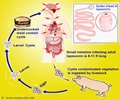People suffering from tuberous sclerosis complex (TSC) could be benefited with a drug, originally developed to prevent the rejection of transplanted organs.

The newest study, led by a physician-scientist at Cincinnati Children's in collaboration with a team at Texas Children's Hospital in Houston, has been accepted by the journal Annals of Neurology, and is available online.
"Everolimus treatment reduced seizure frequency and duration in the majority of TSC epilepsy patients whose seizures previously did not respond to treatment," says Darcy Krueger, MD, PhD, a pediatric neurologist at Cincinnati Children's and lead author of the study. "This improvement in seizure control was associated with a better quality of life, and side effects were limited. Work is already underway to confirm these results in a follow-up, phase III clinical study."
"This has been positively life-changing for the patients involved and is nothing short of transformative in the treatment of epilepsy associated with cellular growth disorders, such as TSC," says Angus Wilfong, MD, director of the comprehensive epilepsy program at Texas Children's Hospital and associate professor of pediatrics and neurology at Baylor College of Medicine.
The study included 20 patients who were treated with everolimus. Their median age was 8. Half of the patients were enrolled at Cincinnati Children's and half at Texas Children's Hospital in Houston.
The researchers found that everolimus reduced seizure frequency by at least 50 percent in 12 of the 20 participants. The drug also reduced seizures in 17 of the 20 TSC patients by a median rate of 73 percent. Four patients were free of seizures and seven had at least a 90 percent reduction in seizure frequency.
Advertisement
Studies in the 1990s traced the cause of TSC to defects in two genes, TSC1 and TSC2. When these genes malfunction, the cell has higher activity of mTOR, a protein known to trigger uncontrolled tumor cell and blood vessel growth. Everolimus shrinks tumors by inhibiting mTORC1, and it appears to reduce seizures in TSC patients in the same way.
Advertisement
Source-Eurekalert














